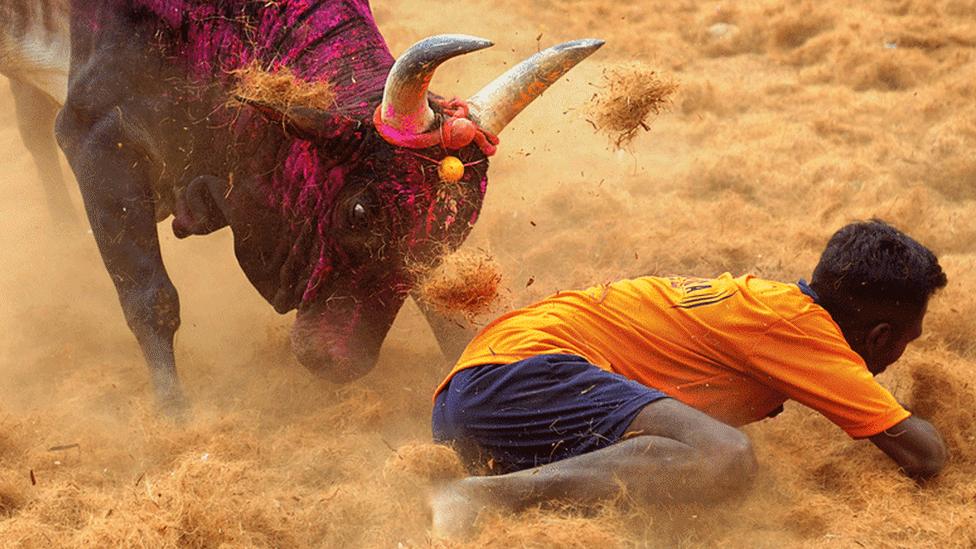India's animal rights activists forced to lie low
- Published
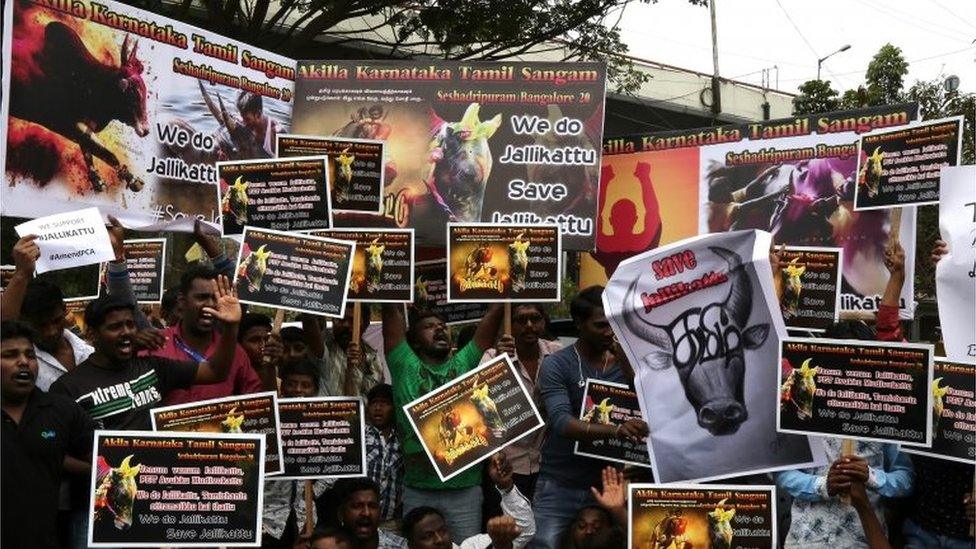
Thousands protested in support of bullfighting in Tamil Nadu in January
The failed campaign to ban bull taming in the southern Indian state of Tamil Nadu has dented support for the animal rights movement and forced local activists to lie low out of fear, as Swaminathan Natarajan reports from Madurai.
So-called Jallikattu contests have been popular in this region for centuries but were banned by the Supreme Court in 2014 after objections from animal rights groups.
Mass protests in support of the contests in January led to a new law overturning the ban.
In the year since then Jallikattu has restarted in many places in and around the temple town of Madurai, but the fall-out from the ban means that formerly welcoming villagers are now reluctant and sometimes even afraid to talk to strangers.
They say clandestine filming and selective editing by animal rights groups has given them a bad name.
People carrying cameras are stopped and asked the purpose of their visit.
"Our office is near one of the Jallikattu venues," says an official working with an Indian animal rights group. "Some locals suspect us of providing evidence of torture to Peta [People for the Ethical Treatment of Animals]. We know there is a lot of hostility and mistrust."
He refuses to talk in detail about the Jallikattu controversy and wants to remain anonymous. Such is the level of fear.

Read more about Tamil Nadu and bullfighting:
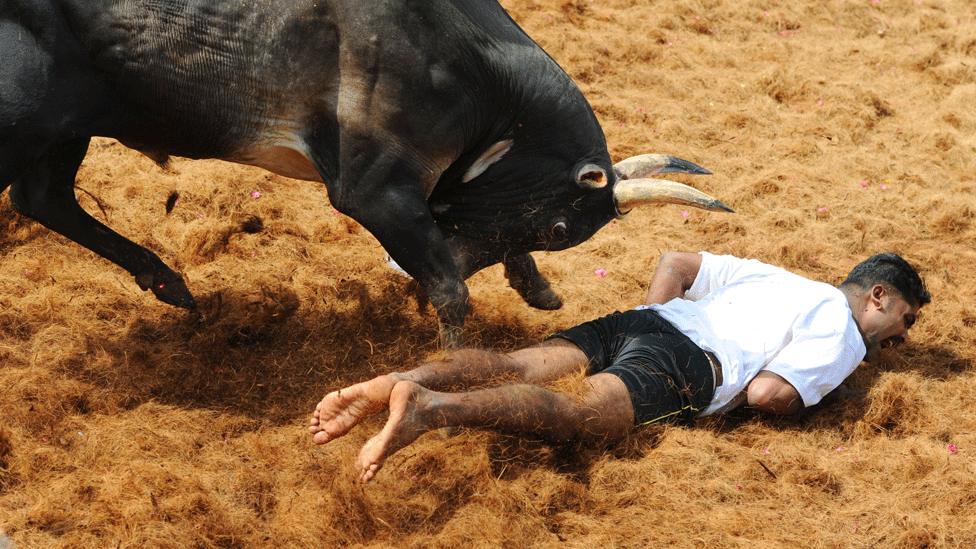

Madurai has a population of more than 1.5 million people. As in so much of India, many stray animals crowd the streets.
Every evening it is common to see people offering temple elephants coins in return for blessings. Begging with elephants is illegal, but the practice continues.
And much more serious mistreatment of animals goes on openly too.
Cows can be seen eating plastic waste; live birds are hung upside down and moved from one place to another by motorcycle; dogs and cats are pelted with stones by children; and bulls and donkeys are worked to exhaustion.
But the city has no animal rescue centre.
"We rented a place to keep abandoned stray dogs but neighbours complained about the noise levels and we had to leave. We are still asking the government to allot land for an animal shelter," says the same animal rights official.
Madurai does have a government-run veterinary hospital which provides free treatment, and a few private clinics which charge for their services.
"Just a few months ago Madurai got two ambulances for animals," says another animal rights campaigner, who also requested anonymity out of fear of repercussions. "This helps to an extent to treat animals involved in traffic accidents,"
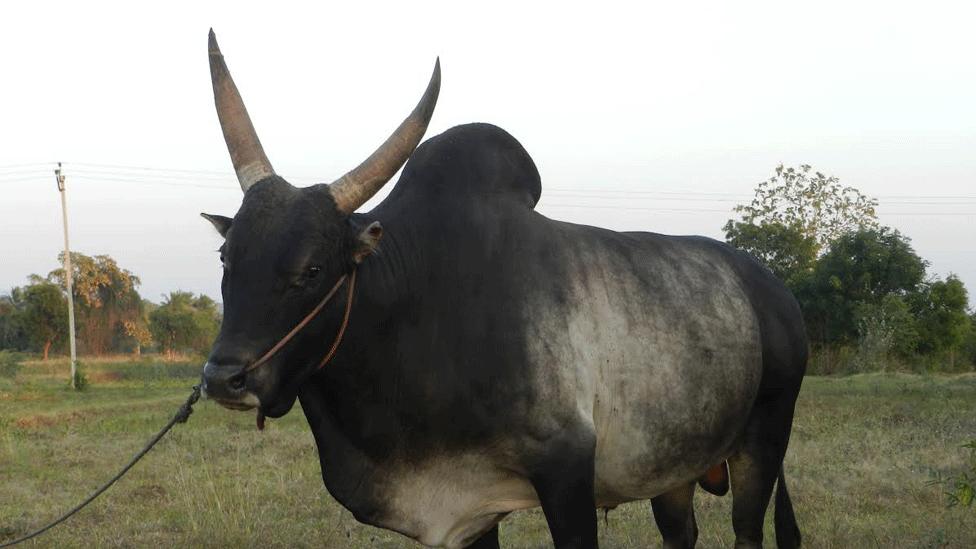
Prize bulls are revered in the villages
But supporters of bull taming say animal rights groups have no right to preach to others about animal welfare.
'Animal rights groups talk nonsense'
A few kilometres away from Allanganallur - one of the main venues for Jallikattu - one can see a memorial to a bull that was buried in front of a temple. Locals say it's a tribute to an animal never tamed and still close to the hearts of villagers.
Visitors now light lamps at the shrine to honour the animal's memory. Many such memorials exist for bulls in Madurai.
"Those who haven't even seen a bull in real life are preaching about animal welfare to people like us who have been living with cattle for generations. This is nonsense," fumes farmer Muthu Raj.
But Peta, the animal rights group, wants the Jallikattu ban restored.
Nikunj Sharma, Peta India's head of public policy, says: "Cruelty to animals and disregard for human life and safety is inherent in Jallikattu."
As evidence, he points to video filmed earlier this year showing participants beating bulls and even allegedly biting their tails, external.
"Just as there can never be a middle ground that allows child abuse, there is no such thing as an acceptable level of causing unnecessary suffering to animals."
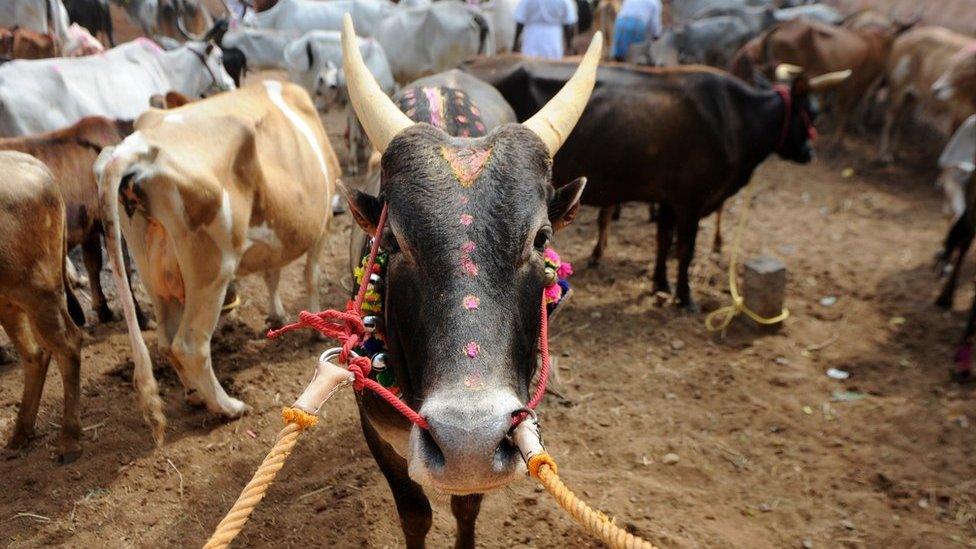
Jallikattu sees bulls released into a crowd of people who try to ride the animals
Cattle trading rules are also a source of controversy.
"Well-connected mafia gangs are involved in this trade and no one is trying to stop it," says S Nizamudeen, founder of the Coimbatore Cattle Care Welfare Trust.
One of the common complaints against activists is that they do not prevent the transportation of animals from Tamil Nadu to neighbouring Kerala.
Unlike most parts of India, slaughtering cattle for human consumption is allowed in Kerala. But many animals suffer or die avoidable deaths while being transported over long distances.
The rules say cattle should each be given at least two square metres of space - yet trucks are often crammed with several times the permissible limit.
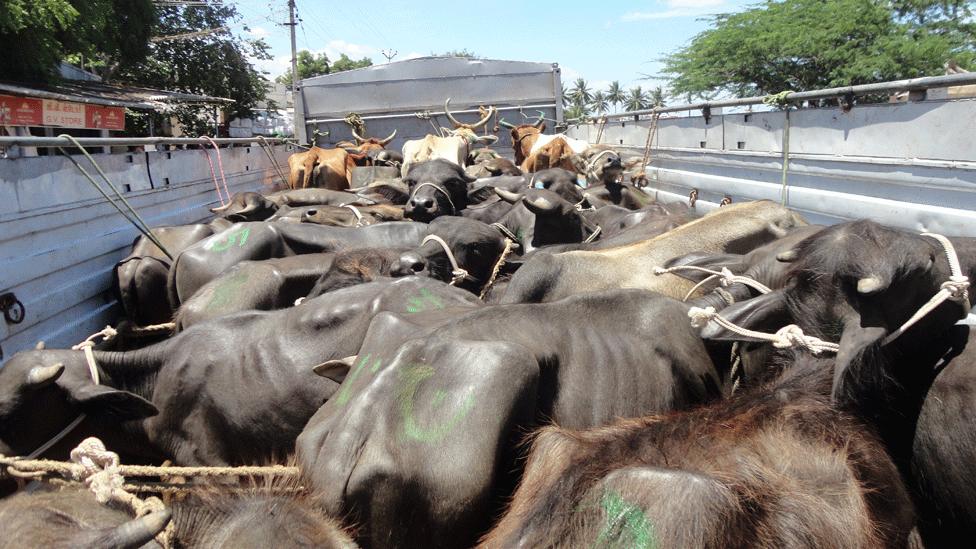
Farmers say rights activists should do more to stop overcrowding in cattle trucks
"We often track down trucks loaded with 40 to 60 animals. But for the police and local administration this is not a priority. The courts let them go after charging them less than a $1 fine per animal," says S Nizamudeen.
Increasing incidents of vigilante groups attacking cattle traders and anyone suspected of consuming beef are overshadowing moral and ethical arguments in favour of animal welfare.
"People who are carrying out attacks in the name of protecting cows are harming the animal rights movement," says Dr S Chinny Krishna, former vice chairman of the Animal Welfare Board of India.
Over the past two decades animal rights groups successfully ended the practice of culling stray dogs by local authorities and stopped animals like elephants, tigers and lions performing in circuses. In some places they have stopped traders offering camel and horse rides and banned sporting spectacles involving animals and birds.
But, now some of these hard-won gains are in danger. In Tamil Nadu, cock fighting has restarted. The neighbouring state of Karnataka has seen a revival of buffalo races known as "kambala", and Maharashtra has lifted its ban on bullock cart races.
"The floodgates have been opened. We are planning a massive public education campaign to win back popular support," says Dr Krishna.
But while that battle goes on, grassroots volunteers must carry on their work with very little public backing.
- Published12 February 2017

- Published21 January 2017
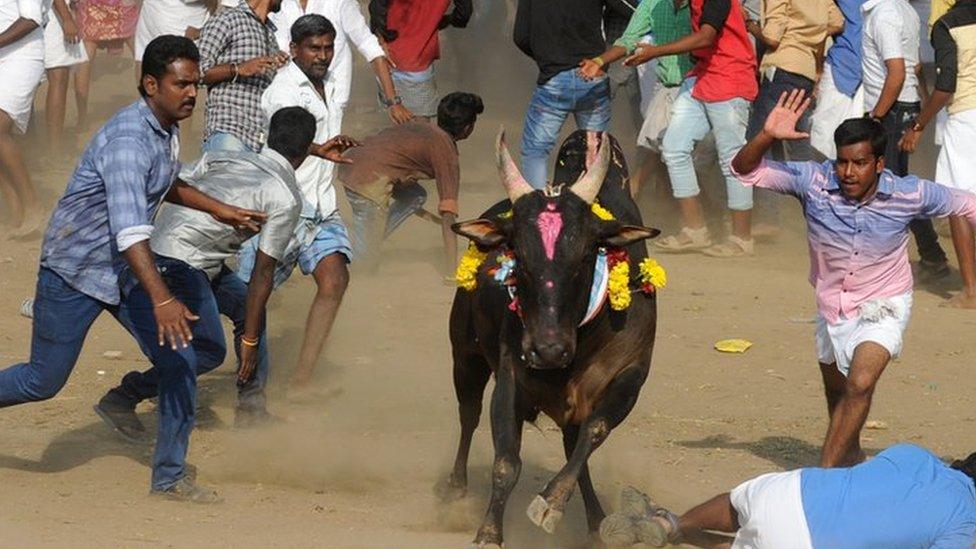
- Published21 January 2017
- Published7 January 2016
